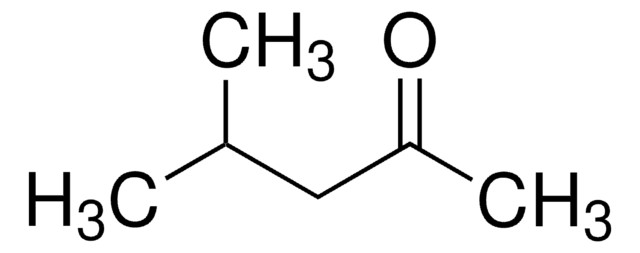8.22262
1-Butanol
EMPLURA®
Synonym(s):
1-Butanol, Butan-1-ol, n-Butyl alcohol, BuOH
About This Item
Recommended Products
vapor pressure
6.7 hPa ( 20 °C)
Quality Level
product line
EMPLURA®
Assay
≥99% (GC)
form
liquid
autoignition temp.
340 °C
potency
790 mg/kg LD50, oral (Rat)
3400 mg/kg LD50, skin (Rabbit)
expl. lim.
1.4-11.3 % (v/v)
impurities
≤0.2% Water (Karl Fischer)
evapn. residue
≤0.004%
pH
7 (20 °C, 70 g/L in H2O)
bp
116-118 °C/1013 hPa
mp
-89 °C
transition temp
flash point 34 °C
solubility
66 g/L
density
0.81 g/cm3 at 20 °C
storage temp.
2-30°C
InChI
1S/C4H10O/c1-2-3-4-5/h5H,2-4H2,1H3
InChI key
LRHPLDYGYMQRHN-UHFFFAOYSA-N
General description
Application
- Characterization and comparison of flavors in fresh and aged fermented peppers: Impact of different varieties: 1-Butanol is used in the analytical methods for evaluating flavor profiles in food research, highlighting its significance in food chemistry and quality control (Liu M et al., 2024).
- Controlling soft rot of green pepper by bacteriocin paracin wx3 and its effect on storage quality of green pepper: The study incorporates 1-Butanol in methodologies to examine the preservation and quality of green peppers, indicating its application in post-harvest technology and plant pathology (Yi L et al., 2024).
- Pathway toward Scalable Energy-Efficient Li-Mediated Ammonia Synthesis: This research utilizes 1-Butanol in processes related to energy-efficient synthesis technologies, underlining its potential in sustainable industrial applications (Kani NC et al., 2024).
Analysis Note
Density (d 20 °C/ 4 °C): 0.809 - 0.810
Water (K. F.): ≤ 0.20 %
Evaporation residue: ≤ 0.004 %
Identity (IR): passes test
Legal Information
Signal Word
Danger
Hazard Statements
Precautionary Statements
Hazard Classifications
Acute Tox. 4 Oral - Eye Dam. 1 - Flam. Liq. 3 - Skin Irrit. 2
Storage Class Code
3 - Flammable liquids
WGK
WGK 1
Flash Point(F)
95.0 °F - Pensky-Martens closed cup
Flash Point(C)
35 °C - Pensky-Martens closed cup
Certificates of Analysis (COA)
Search for Certificates of Analysis (COA) by entering the products Lot/Batch Number. Lot and Batch Numbers can be found on a product’s label following the words ‘Lot’ or ‘Batch’.
Already Own This Product?
Find documentation for the products that you have recently purchased in the Document Library.
Customers Also Viewed
Protocols
A guide to create solvent systems used for the thin-layer chromatography assay of Novabiochem products.
Our team of scientists has experience in all areas of research including Life Science, Material Science, Chemical Synthesis, Chromatography, Analytical and many others.
Contact Technical Service







